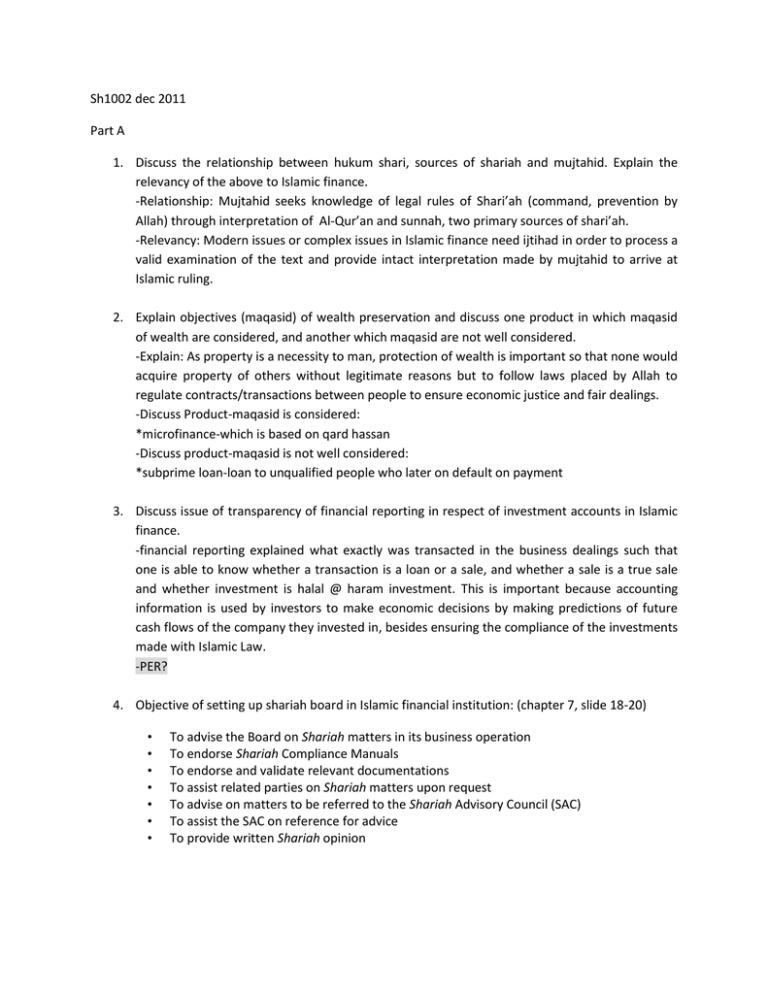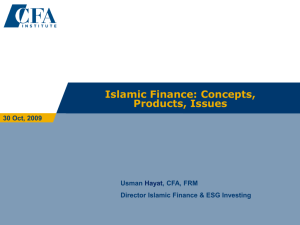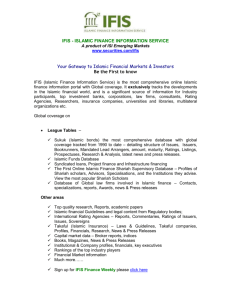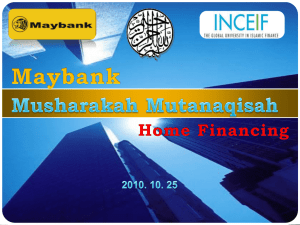to view the attachment
advertisement

Sh1002 dec 2011 Part A 1. Discuss the relationship between hukum shari, sources of shariah and mujtahid. Explain the relevancy of the above to Islamic finance. -Relationship: Mujtahid seeks knowledge of legal rules of Shari’ah (command, prevention by Allah) through interpretation of Al-Qur’an and sunnah, two primary sources of shari’ah. -Relevancy: Modern issues or complex issues in Islamic finance need ijtihad in order to process a valid examination of the text and provide intact interpretation made by mujtahid to arrive at Islamic ruling. 2. Explain objectives (maqasid) of wealth preservation and discuss one product in which maqasid of wealth are considered, and another which maqasid are not well considered. -Explain: As property is a necessity to man, protection of wealth is important so that none would acquire property of others without legitimate reasons but to follow laws placed by Allah to regulate contracts/transactions between people to ensure economic justice and fair dealings. -Discuss Product-maqasid is considered: *microfinance-which is based on qard hassan -Discuss product-maqasid is not well considered: *subprime loan-loan to unqualified people who later on default on payment 3. Discuss issue of transparency of financial reporting in respect of investment accounts in Islamic finance. -financial reporting explained what exactly was transacted in the business dealings such that one is able to know whether a transaction is a loan or a sale, and whether a sale is a true sale and whether investment is halal @ haram investment. This is important because accounting information is used by investors to make economic decisions by making predictions of future cash flows of the company they invested in, besides ensuring the compliance of the investments made with Islamic Law. -PER? 4. Objective of setting up shariah board in Islamic financial institution: (chapter 7, slide 18-20) • • • • • • • To advise the Board on Shariah matters in its business operation To endorse Shariah Compliance Manuals To endorse and validate relevant documentations To assist related parties on Shariah matters upon request To advise on matters to be referred to the Shariah Advisory Council (SAC) To assist the SAC on reference for advice To provide written Shariah opinion 5. There are FIVE (5) major classifications on contracts in Islamic commercial Law in terms of contracting parties, their statement, and subject matter, etc. please list them, and elaborate on ONE (1) of them. (chapter 12, slide 7) Classification from the viewpoint of soundness and legal effects according to shari’ah; Contracts are divided into 3: (unit 12, p. 4) a. Valid (sahih) contract: fulfill all pillars and conditions and is not connected to attributes that would make it unlawful. According to Hanafi, valid contract is divided further into effective (nafidh) and dependent (mawquf). Nafidh contract is issued by those who have proper charge over it while Mawquf contract is issued by a person with capability of concluding the contract but is not in charge of doing so. Nafidh contract is divided into two, legally binding (lazim) whereby consent from both parties are needed in cancellation of the contract, and not legally binding (ghayr al-lazim) is a contract in which any parties can cancel the contract without the consent of the other [eg. Partnership (sharikah), agency (wakalah), will (wasiyyah), lending (‘ariyah), deposit (wadiah)]. b. Invalid (batil) and imperfect (fasid) contract: according to hanafi, a contract is invalid if a pillar does not exist and imperfect if a condition or an important attribute of a contract is not fulfill. According to majority, a contract is invalid if any of one of three aspects- pillars, conditions, or important attributes- do not exist. Part B 1. Hardship begets facility (Al-Mashaqqah Tajlib al-Taysir). Explain this legal maxim and discuss the relevant Shariah issues in Islamic finance related to hardship which may be faced because of compulsion, distress and universal affliction (umum balwa), physical handicap, ignorance, forgetfulness, sickness. Explain: (unit 4, p12) -Hardship in this maxim refers to hardships that surpass normal limit and ability of a person to perform them. -Hardship in implementing obligatory duty such as hardship in performing ibadah [eg. In fasting, hajj, jihad] do not fall under this interpretation as they are bearable and within the ability of a person, and will cause no harm on those who execute/perform them. -Imam al-Ghazali: “everything that exceeds its limit changes into its opposite”. -“Allah wants ease for you, not hardship.” (al-Baqarah:185). -Aishah r.a. said, “Whenever the Messenger of Allah (pbuh) was given a choice between two things, he would choose the easier one unless it was a sin.” -The hardship becomes the cause (sabab) of facilitation (tashil) in the form of a concession (rukhsah) -Difficulty is to be accompanied by easiness. -some example of rukhsah: shortened and combined form of salah, permission to defer obligation to fast for travellers -Hardship is conditioned on: ~the necessity should not be speculative or imaginative ~no lawful alternative should be available to the suffering person than the one which calls for relaxation ~the solution should not infringe the rights of the people -Hardship can be identified: (chapter 4, slide 26) ~by a text (nusus), or be a matter of consensus, or be inferred from a text by a process of deduction ~people’s customs (‘urf) -Discuss relevant shari’ah issues in IF: a. Salam contracts are permissible as an exception to the general prohibition of selling things that do not yet exist b. Permission to deal with conventional banks for Muslim minority living in non-Muslim countries-allow to temporarily use conventional banking c. Insurance-if Muslims are not allowed to take insurance, they might be subjected to certain hardship 2. Maqasid al-Shariah is among the important Shariah aspects in Islamic finance. Discuss this statement within the Islamic context. (unit 5, p. 20) -has to aim at achieving maqasid al-Shariah: primary objective of the shariah is the realization of benefit to the people, concerning to their affairs both in this world and the hereafter -focus on the protection of al-Din, life, lineage, intellect, and property -objective of shariah in financial transactions refer to overall goals which include the objectives of: a. the objective of the continuity of circulation of wealth b. the objective of continuity of investment of wealth c. the objective of achieving comprehensive communal prosperity d. the objective of validation of financial ownership e. preservation and protection of the wealth in Islamic business transactions f. transparency in wealth and finance g. development and investment of wealth in business transactions h. prevent harm and hardship in wealth and finance i. ensure justice in the circulation of wealth in business transaction -By achieving these objectives, everyone will have wealth enough to do commandment of Allah (eg. zakah, hajj, sedekah), ensure sustainable living, gain knowledge/ have proper education, and collect wealth by sacrificing current consumption for the next generation. 3. According to al-Mawardi, Hisbah is enjoining what is right when it is found to be neglected and forbidding what is wrong when it is found to be practiced. Analyze this definition and explain how Hisbah can be practiced in Islamic Finance Industry. -Analyze definition: *in line with al-Imran:103 and hadith (unit 6, side 6) *Hisbah is important to the overall Islamic social order, that is to bring about a stable and secure society whereby members of society work together in righteous and wholesome activities -Explain how hisbah can be practiced in Islamic finance Industry: *standard setting organization-AAOIFI *resolution and law-islamic Fiqh Academy *shari’ah audit-see the compliance of IFIs to shari’ah in all of its activities, particularly financial statements and other operational components of IFIs; products, operational processes, documentation and contracts, people, policy and ethical conduct *auditing-check for fraudulent activities, give assurance on that the financial reports are true 4. In legal documentation the terms and conditions of contracts are determined to establish the firmness or legitimacy of the contract as well as to address specific needs or requirements of the counterparties. Explain the above statement by elaborating on the importance of legal documentation in Islamic finance and their impact on financial transactions. -Legal documentation reflects the rights and liabilities of two contracting parties as the result of entering into a particular contract and it renders them enforceable from legal perspective -sound and legal documentation to protect the interest of all parties and provide confidence to public/user -Importance of legal documentation: *avoid disputes between parties or based for judgment in courts if matters arised *to make sure that there is no prohibited element or anything that against the Shariah exist in the contract: prohibition of riba’, ghara, maysir or qimar, two contracts in one contract -Impact on financial transactions: *lead to a clear contract *produce transactions which conform to Shari’ah law * 5. Do you recommend having a centralized Shariah Board at the national level to clear the Shariah matter in Islamic finance or to have it at the level of the IFI? Or to have it at both level? -both level Function of National Shari’ah Board: SAC-(unit 17, slide 16) *To analyze issues on Islamic banking, takaful and capital market *To ensure that all aspects of the operations of Islamic financial institutions are in accordance with Shari’ah principles *resolution Function at IFI level: Shariah board *plays significant role in IFI’s governance structure for safety and soundness of IFIs: shari’ah governance framework, legal framework, regulatory framework -Why sould have shari’ah board at both level? *to have shari’ah people inside banking institution itself allows immediate consultation *by having shari’ah board at both level, this encourage proper judgment by shari’ah board at IFI as SAC will be supervising. *






